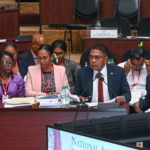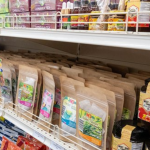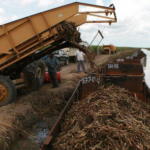– progress made with Suriname to license Corentyne fishermen
Guyana’s Fisheries industry will, over the next five years, realize its full potential as government continues to direct its efforts towards crafting policies geared at ensuring sustainability of the sector.
Fisheries in Guyana has, over the years, evolved into one of the largest income earners for the economy, raking in some $16B in 2020.
As part of government’s efforts to further develop the industry, Agriculture Minister Zulfikar Mustapha today met with members of the newly installed Fisheries Advisory Committee and the Guyana Fisheries Limited Board (GFLB).
During the meeting, Minister Mustapha charged the new bodies with examining issues faced in the sector and providing recommendations to move the sector forward.
“With these times we are encountering several challenges in the fishing industry, not only with the crisis we have with Guyana and Venezuela, but as a country sharing borders with a number of other countries. Especially with Suriname and Venezuela, we have to ensure we look at issues faced by persons in the industry and provide recommendations to move the sector forward. We all know the importance of the fishing industry in supporting the economy of our country and government has been putting a lot of effort and resources into the sector. It contributes almost 12% to the agriculture GDP, provides employment with over 15,000 persons directly employed in the industry, and is a large income generator, especially in the rural areas across our country,” Minister Mustapha said.
Minister Mustapha also stated that it was important to ensure all management measures were employed to ensure the sustainability of the industry. He also outlined some of the expectations government has for the newly installed Fisheries Advisory Committee.

“As the body mandated to help us craft policies, you have to ensure that you craft policies that would be able to help our fisherfolk to sustain their income while ensuring the industry continues to make a valuable contribution to Guyana’s GDP. The Fisheries Advisory Committee must also ensure that it carries out its mandate to advise on the management and development of the fisheries sector. We are looking to you to devise plans and programmes to guide government’s vision for the expansion of the fishing industry, aligning it with government’s priorities. We were elected based on the measures outlined in the manifesto and we have to ensure those measures become policies. One of those measures is to enhance support for fishermen and coorp societies, and you know we are now looking to resuscitate the National Fisherfolk Organization. We also have to look at the promotion of commercial fisheries, which should include partnerships with investors who already have established markets. It is also important for you to look closely at ensuring that fishermen displaced by activities in the oil and gas sector are compensated, if any,” Minister Mustapha said.
Minister Mustapha also took the opportunity to inform the members on the progress made with regards to fishermen from Corentyne and Suriname.
“We’ve had some very positive feedback from the Surinamese government. We are on the verge of securing licenses for Guyanese fishermen. Two days ago I received a correspondence from the Surinamese Government and I’m optimistic that this will be the first time in the history of our country that our fishermen might be licensed directly by the Surinamese authorities. So the problems that we’ve been faced with, where the middle men normally charge large fees for small fishermen to have licenses could be abolished,” Minister Mustapha said.
Newly appointed Chairman of the Fisheries Advisory Committee Seepaul Narine while addressing the members said that the members of the bodies should work to ensure they utilize their efforts to advance the sector.

“The magnitude of this industry cannot be underestimated if we are talking about 15,000 persons, and, because of the closure of two plants, we are still talking a large number of the population when you take into account those who are employed and their families who depend on them. I would wish that, during our tenure, we work hard, we put our efforts together and we utilize the expertise around this table,” Mr. Narine said.
Additionally, newly elected Chairman of the Guyana Fisheries Limited Mohammed Khan said that he hopes the committees can work together to once again stabilize the sector.
“As the Minister said, we are indeed making a tremendous contribution to this country. The latest figure I have is between 15,000 to 17,000 people working in fisheries. It’s a little bit down now because of two plants that closed down recently. I do hope that with the new committees, we work together to bring back the fisheries industry to a stable position,” Mr. Khan said.

Issues in the sector
President of the Guyana Association of Trawler Owners and Seafood Processors (GATOSP) Ruben Charles said that he hopes the Board and the Committee can work making representation to have a study conducted the effects of oil exploration is having on the low level of catches.
“Lots of things have happened and I’m glad that I’m in a position to say something about the future of the industry. Our organization, the Trawlers Association is experiencing some difficulty now in terms of catch levels and members of that association are, without any scientific guidance, are attributing that to the drilling of oil out there. One of the things we would be seeking is to see how we can mount some investigation to prove whether that is so,” Mr. Charles said.

Minister Mustapha said that issues such as factors contributing to low catches will be addressed. He added that the Board and the committee have the Ministry’s full support to make representation for studies to be conducted to determine whether oil exploration activities are indeed affecting the sector and a determining a sustainable way forward for the sector.





